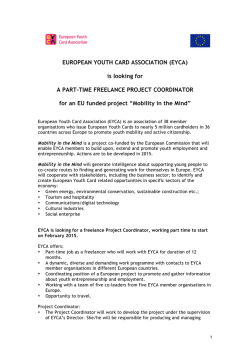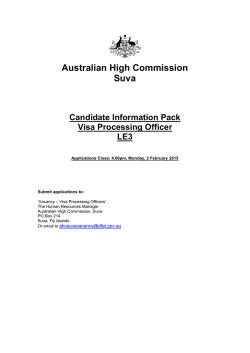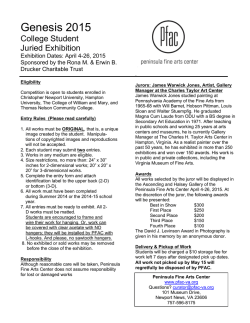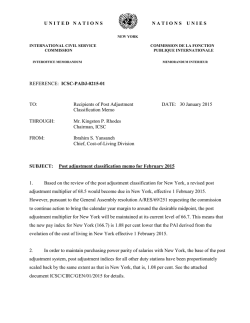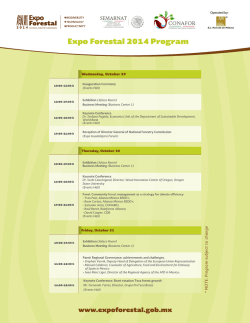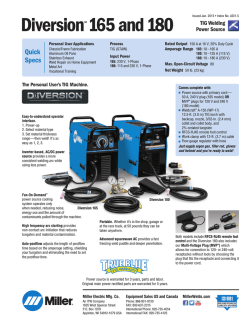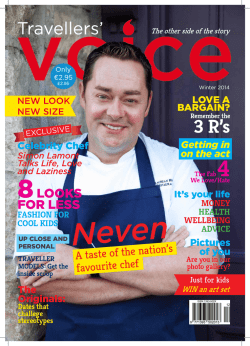
Download Brochure
Earn 25 CPD points for attending this event Delegates attending this conference may be eligible to receive Continuing Professional Education credit or CPEs toward ASIS re-certification. Individuals seeking re-certification credit should check with ASIS and review the filing process at https://www.asisonline.org/Certification/Recertification/Pages/default.aspx Quaynote’s 3rd international conference on Duty of care Protecting workers & students overseas Tuesday 17th & Wednesday 18th February 2015, Millennium Gloucester Hotel, London, United Kingdom The future suggests an increase in corporate & scholastic travel with many organisations venturing to destinations outside of their historic territory. As new but unfamiliar destinations open up, organisations must now evaluate whether their duty of care policies and procedures are still adequate for the regions in which they operate. Quaynote’s 3rd international conference on Duty of care - Protecting workers & students overseas will continue to discuss and bring to the forefront many of the complex issues employers and institutions have to face when responsible for workers and students overseas. Learn, network and gain free CPD points This conference is CPD accredited by The Security Institute. Attendance will reward delegates with 25 Continuing Professional Development Points. Media partners and supporting organisations Exhibitors Who should attend? Why attend this conference? The conference will provide the perfect opportunity to network with your peers in the industry and to swap ideas and best practice. When employees work across borders, duty of care involves risk management beyond the usual health and safety requirements of a familiar environment. As workforces become more mobile, fulfilling duty of care can seem like a daunting task for employers which is made more challenging by the inconsistent standards across the globe. The balance between having reasonable processes in place to protect staff overseas and conducting business in an efficient and profitable manner can sometimes be difficult. Anyone who is responsible for the security, health & safety and wellbeing of employees, contractors, sub-contractors, volunteers and students while they are overseas will find the event especially useful as will those professionals with an interest in duty of care and limiting employee or student exposure to risk, particularly those involved in the areas of; Corporate & physical security professionals Human resources Health & safety Corporate travel Risk management & insurance Assistance & rescue Legal (inhouse & private practice) Business Continuity University administration Project advisers Operational security & intelligence As western companies seek to capitalise on increased consumer demand from emerging markets, it is many of these perceived high growth areas that are also deemed to be at high risk of terrorism, disease and riots. Threats faced could range from theft of confidential and sensitive information, bribery, sexual assault to the more widespread and unpredictable issues of terrorism, political upheaval, infectious diseases, and natural disasters, all of which increase the risk to the business traveller and in so doing the potential liability of the employer. The future suggests an increase in corporate & scholastic travel with many organisations venturing to destinations outside of their historic territory. As new but unfamiliar destinations open up, organisations must now evaluate whether their duty of care policies and procedures are still adequate for the regions in which they operate. Many organisations are still unclear as to the scope of their liability regarding duty of care. Duty of care is not an ethical concern but a legal obligation which is embedded in workers compensation laws in the UK and can extend as far as the dependents of international assignees. By protecting your employees, your most valuable asset, you are protecting your business, financial and reputational risks. By attending this conference, delegates will be able to hear the latest advice on risks posed to workers travelling overeseas and assess whether their own in-house travel and risk procedures are up to date. Delegates will be able to ensure they adequately understand the legal implications and liabilities of managing overseas workers and that they are meeting their Duty of Care requirements. The conference will provide an excellent opportunity to network with peers, swap ideas and best practice and meet face to face the technology providers who are offering solutions in this area. To book a place on-line visit www.regonline.com/dutyofcare2015 For further information contact Caroline Fuller at [email protected] +44 (0) 797 4406 673 Programme (subject to change) Fr21st Tuesday 17th February 2015 08.00 Refreshments, registration and exhibition 08.50 Conference organiser`s opening remarks 08.55 Welcome from the Chair Declan Meighan, CEO, Maxwell Lucas Session One: What could possibly go wrong? 09.00 What risks are being posed to travellers in 2015 and where are they happening? l l l l l Overview of threats to travellers The most significant development over the past year in the threat to travellers – ie the emergence of the Islamic State (IS) and the subsequent air strikes against it in Syria and Iraq Risk to travellers from IS sympathisers and the direct threat from IS Threats not directly linked to IS, such as Kurdish unrest in Turkey and increased instability and criminality in Lebanon What companies can do to understand and mitigate such threats George Readings, Senior Editor, Stirling Assynt 09.25 Supporting international organisations to prepare and plan for the Ebola crisis l Identifying the scope, needs and associated health risks l Defining appropriate but flexible response plans to ensure safety of employees and business continuity throughout the course of the epidemic l Debunking the myths of the disease – the importance of consistent, accurate and ongoing communications Dr Katie Geary , Medical Director – Assistance, International SOS 09.50 Safeguarding the health & welfare of personnel during emergency humanitarian missions - lessons learned from the Ebola Outbreak l Defining level of risk in order to put in place appropriate risk reduction measures proportional to that risk l Adequate preparation - physical & psychological health screening and preparation/resilience building l Sustaining health & wellbeing in the field l Aftercare on return home l Managing concerns of UK-based staff as well as friends/family Dr Simon Clift , Director of Health Services, InterHealth Worldwide 10.15 Questions Programme (subject to change) FriFriday Tuesday 17th February 2015 Session Two: Who are we sending overseas? 10.25 Novice versus seasoned business travellers - how should an organisation meet its duty of care for each? l What makes a traveller novice or experienced? l The issue of experience and confidence leading to complacency l How much responsibility should an individual accept for their own risk and should this differ with age? l Should organisations be looking at different polices and procedures for each? Suzanne Garber, International Film Producer & Travel Executive 10.50 Safeguarding the female traveller - how can companies develop programmes which enable female employees to safely and effectively conduct business overseas? l Understanding the limitations of generic advice l Issues arising from restrictive travel advice for women l What are the key differences in the risk environment faced by women? l How can multinational organisations overcome the challenges posed by cultural principals and attitudes to women in certain countries? l Pregnancy and travel - will your insurance cover complications? Carolyn Pearson, CEO, maiden-voyage.com 11.15 Refreshments & Exhibition Session Three: Kidnapping 11.40 Global kidnapping trends - where, why and how do different Kidnap for Ransom business models flourish? l An alternative view of this global and globalised phenomena that seeks to understand the threat by examining the perpetrators’ perspective. Alex Murray MBE, Operations Manager (Consulting), NYA International Limited 12.05 Questions Programme (subject to change) FriFriday Tuesday 17th February 2015 Session Four: Duty of care perception & legal obligations 12.15 PANEL SESSION - Understanding the laws surrounding duty of care As an employer or institution, do you fully understand the scope of your liability regarding duty of care? This panel session aims to shed light on common questions, to clarify areas of confusion and to dispel common myths. l l l l l l l l l l l l l l Outline of the legal context and obligations Being wise to local laws in the countries you operate in What proactive steps should an employer take to make an employee aware of the health risks in the area they are travelling to ? To what extent do organisations need to prove the employee’s understanding of their polices and procedures before allowing travel? Does the law recognise the reponsibility of the individual to exercise certain actions to ensure their welfare? Informed consent and the right to withdraw What is an ‘assumption of risk waiver and are they upheld by courts? Breaches of care and contributory negligence Refusal to adhere to policy - what is the employer recourse? Can the duty to risk access overseas workplaces be delegated to a third party? What is a dynamic risk assessment? The control test and agency agreements When might contractual indemnity be required? Vicarious liability Andrew Caplan, Partner, Kennedys Jacqueline Cursiter, Associate, CMS Cameron McKenna Suzanne Garber, International Film Producer & Travel Executive 13.00 Lunch & exhibition Programme (subject to change) FriFriday Tuesday 17th February 2015 Session Five: Developing your duty of care policies and procedures 14.00 The challenges of implementing a travel tracking solution l What are the common pitfalls and how might these be avoided? Nick Hymans CPP CSyP, Regional Head Security Services EMEA, Credit Suisse 14.20 Training your staff in situational awareness Key tips the savvy traveller should never forget Guarding against scam techniques and common distractions Don’t let this happen to you - using past incidents and near misses to highlight what does actually go wrong l Social media DOs and DON’Ts l l l Angela Lawson MSc MSyI, Snr Lecturer in Security Studies, Resilience and Business Continuity, Buckinghamshire New University 14.40 Africa bound travellers - how can organisations effectively inform of the risks and threats without creating paranoia? l How necessary is documented and informed consent? l Combatting anticipatory anxiety Sandra Neylon, Group Health Manager, Tullow Oil 15.00 Questions Programme (subject to change) FriFriday Tuesday 17th February 2015 15.10 PANEL SESSION - Developing a behavioural code of conduct for staff travelling overseas l Organisational culture l Understanding where your company is most exposed l Ensuring employee compliance l Misconduct overseas l Immunisations and anti-malarials - how to ensure your staff get them l Freetime during travel status - at what point are you not on duty? l Venturing off the beaten track - where do the boundaries of employer liability lie? Andrew Kain, Founder & CEO, AKE Charissa Upton, Senior Associate, Charles Russell Nigel Carpenter, Director, Group Security & Emergency Preparedness , Amec Foster Wheeler Plc 15.40 Refreshments & exhibition Session Six: Case Studies 16.05 Greenpeace and its duty of care to the activists detained in Russia Kate Morton, Global HR Manager, Greenpeace International 16.30 AECOM case study l Resiliency – using a three pillar strategy of Anticipate, Avoid and Absorb Chris Rackow, Vice President & Chief Resilience Officer, AECOM 16.55 Crashing a plane in the Mexican desert - award-winning executive producer Sanjay Singhal talks about the legal requirements for ensuring the safety of crew and by-standers in the filming of ‘Plane Crash’ Sanjay Singhal, Chief Executive, Voltage TV 17.20 Questions 17.30 Close of Day One and Networking Drinks Reception Programme (subject to change) Wednesday 18th February 2015 The Corporate Stream 09.10 Welcome from Chair Declan Meighan, CEO, Maxwell Lucas A CEO’s Perspective – considerations on what gets my buy-in? l A Security Policy that is fit for purpose and effectively covers all risks l Corporate understanding of where ‘Responsibility’ for Crisis Management resides l Sufficient authority delegated to Crisis Management team to ensure its effective operation l Understanding how to achieve ROI for effective travel risk management Andrew Kain, Founder & CEO, AKE 09.40 Energy & extractives industry case study l pushing travel risk management up the agenda l ownership of the travel management plan - bringing together the stakeholders l conducting test runs with the crisis management team l creating a travel culture before it is created for you l Post trip feedback Nigel Carpenter, Director, Group Security & Emergency Preparedness , Amec Foster Wheeler Plc 09.15 10.05 Why is cyber-crime such a significant and overlooked risk to the business traveller? John Rose, COO, iJET 10.30 Negative media publicity - can your company withstand brand destruction? l internal reputation damage Shane Fankhauser International Broadcast Media Consultant 10.50 Questions 11.10 Refreshments & exhibition The University/Charity/NGO stream 09.10 Welcome from Chair Rachel Stephenson, Director, Health and Safety Services, University of Hull 09.15 What challenges are facing the educational sector as it strives to meet its duty of care requirements to travelling staff & students? l Challenges around risk assessing study abroad programmes l Reputational risk from incidents l Duty of care as a receiver to overseas students l Understanding where your institution is most exposed Anthony Val Flynn, Security Team, European Commission’s Humanitarian Aid and Civil Protection department (ECHO) 09.40 The changing security landscape for NGOs Ebe Brons, BoD INSSA & Director Centre for for Safety and Development 10.05 Avoiding burn-out & compassion fatigue - best practice for NGO staff well-being Kate Nowlan, Chief Executive, CiC 10.30 The challenges of academic research in high risk areas Michael Smith, Safety Policy Adviser London School of Hygiene & Tropical Medicine 10.50 Questions 11.10 Refreshments & exhibition Programme (subject to change) FriFriday Wednesday 18th February 2015 Session Eight: Working with third parties when things go wrong 11.35 Screening third parties - do you know who you are working with? l Expectations towards local providers l Vetting local providers (transportation, guarding, advisors, incident response) l Pitfalls in the use of local providers with real life examples l Recommendations for vetting and improving cooperation with local providers Pascal Michel, Director, International Services, Result Group GmbH 12.00 To what extent can an embassy or consulate assist during a crisis? l What assistance can an embassy or consultate offer? l What common misconceptions arise? l Assisting a multinational group of employees during a crisis l Working with international agencies l Understanding how bribery & corruption risks may impact your travelling employees Maria Rennie, Head Crisis Training & Exercising Team, Crisis Management Department Foreign and Commonwealth Office 12.20 Questions 12.30 PANEL - SESSION -What current and emerging travel tracker technology can assist organisations during a crisis and enable them to effectively meet their duty of care responsibilities? l Understanding your corporate appetite for tracking employees l Issues around legitimately implementing a tracking system l How do functionality and tools vary? l Cyber security and devices - can you get hacked and tracked by criminals? l What technology is available where there is no cellular or standard telephony service? John Rose, COO, iJET John Scott, Managing Director, Voyage Manager Terry Daniels, General Manager , Range Global Services 13.00 Lunch and exhibition Programme (subject to change) FriFriday Wednesday 18th February 2015 Session Nine: Split Streams Session Six: Split Streams Preparing your short-term traveller for forseeable risk Safeguarding expats and residential students 14.15 Ground transportation and driving overseas l Why are road traffic accidents such a significant risk for business travellers and NGO staff? l Key warnings around self-driving l Issues around lack of safety belt legislation in some countries Terrance Wesbrock, Director of Global Security, International Medical Corps Andrew Kain, Founder & CEO, AKE 15.05 PANEL SESSION Managing the challenges posed by last minute travel l overcoming obstacles posed by inaccurate travel data l booking outside of approved vendors l hotel security - what are the biggest threats? Carolyn Pearson, CEO, maiden-voyage.com Terrance Wesbrock, Director of Global Security, International Medical Corps Kate Morton, Global HR Manager, Greenpeace International 15.30 Questions 15.40 Refreshments & exhibition Air pollution - how does an employer or institution meet their duty of care when sending employees or students to areas suffering high levels of air pollution? via weblink Dr. Gordon Peters, Medical Director, North Asia, International SOS 14.40 The challenges faced by trailing spouses 14.40 Promoting cultural awareness to the short stay traveller 14.15 Andy Davis, Managing Director, Trident Manor 15.05 Hostile Surveillance Recognition For Expats l Importance of surveillance detection l Principles of surveillance detection l Detecting surveillance around frequently visited locations l Foot and mobile anti-surveillance tactics l Common surveillance errors l If you detect surveillance 15.30 15.40 Michael Cannon DCM, FSyl, CPP, CMAS, Founder/Managing Director, Security Surveillance Solutions Questions Refreshments & exhibition Programme (subject to change) FriFriday Wednesday 18th February 2015 Session Ten: Selection criteria 16.05 PANEL SESSION : Matchmaking assignments to the right candidate how does selection criteria differ among corporations, universities and NGOs l Understanding the impact of destination and occupational risk l The mental strains of aid work - are you hiring the right staff? l Assessing the needs of a project or assignment and selecting the right candidate Anthony Val Flynn, Security Team, European Commission’s Humanitarian Aid and Civil Protection department (ECHO) Kate Nowlan, Chief Executive, CiC Sandra Neylon, Group Health Manager, Tullow Oil 16.30 Chair’s closing remarks 16.35 Close of conference The Venue Millennium Gloucester Hotel London Kensington 4-18 Harrington Gardens, London, SW7 4LH United Kingdom T.+44 (0) 20 7373 6030 F.+44 (0) 20 7373 0409 http://www.millenniumhotels.co.uk/millenniumgloucester Situated next to Gloucester Road underground station, with access to three major tube lines, the Millennium Gloucester Hotel London Kensington is located in central London in the fashionable district of South Kensington. It is easily accessible from both Heathrow and Gatwick Airports and London’s business districts. The hotel is close to Hyde Park, Royal Albert Hall, Kensington Palace and Gardens. Millennium Gloucester hotel has 3 restaurants, the Bugis Street Brasserie offering Singaporean Chinese and Asian dishes, the South West 7, a private function room, and the Bombay Brasserie known for its Indian cuisine. Drinks are served in two cocktail lounges and a club bar. Olive’s Restaurant is chic and fashionable restaurant that serves international cuisine; Olives Bar is a favorite place to meet. Humphrey’s Bar is a great place for a relaxing drink. The Conservatory is a truly stunning glass room, enhanced by its splendidly up-lit palm trees and will provide the perfect venue for the conference networking drinks reception. We have room rates agreed with the conference hotel of £133 + VAT per night including full English breakfast. To book in at this rate please email [email protected] giving your name, date number of nights and quoting the code QUAY160215. Alternatively call the hotel on 44 (0)207 373 0409 quoting the code. Duty of care Protecting workers & students overseas 17th & 18th February 2015, London Complete all relevant sections of this form and either: Fax: 44 (0) 208 181 7251 Email: [email protected] Or register online at www.regonline.com/dutyofcare2015 Holiday Inn Kensington Forum, London, UK 97 Cromwell Rd, London SW7 4DN Tel + 44 (0) 871 942 9094 Title Name Position Organisation Address Email Tel Fax Additional requirements - please describe them here Delegate fees o Standard rate: (Duty of care conference only): £495 + VAT = £594 o Standard rate: (Duty of care + Lone Workers conference): £795 + VAT = £954 Fees include access to the conference(s), buffet lunch, refreshments and evening drinks reception. How to pay o Invoice Please send an invoice to ___________________________________________________________________ ______________________________________________________________________________________________________ o Cheque I enclose a cheque made payable to Quaynote Communications o Credit card Please debit _____________________ from my AMEX/Eurocard/Delta/Mastercard/Switch/Visa Card No___________________________________________________________________ Expiry Date__________________________________ Switch Issue No Signature- Terms and conditions This booking form constitutes a legally binding agreement. Payment must be paid in full prior to the event. Cancellations must be confirmed in writing one month before the day of the conference and will be refunded minus an administration fee of 100 GBP. We regret that no refund can be made after that date for whatever reason. Substitutions will be accepted if notified in writing prior to the event. Database protection The personal information that you provide will be held on a database by Quaynote Communications Ltd. If you do not want to receive information about other products from Quaynote please write to database manager, 30 Fairfield Road, London, N8 9HG. UK. For further information email or [email protected] telephone +44 (0) 7974406673
© Copyright 2026
